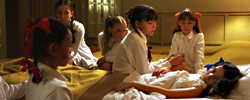It’s a good thing Henry Darger didn’t live to see this film. So fond of drawing naked prepubescent nymphs, the reclusive American artist would have been overwhelmed by the topless (yet still breastless) French schoolgirls frolicking in an idyllic lake. Later, clothed in immaculate white outfits, they do gymnastics in the woods. Later still, they perform a butterfly fertility ballet before an unseen male audience. When one guy shouts, “You’re the prettiest,” and tosses a rose onstage, you’re unsure whether he’s a pervert or not.
It’s one of many questions and potentially disturbing avenues not explored in this quietly, insistently obvious coming-of-age fable by Lucile Hadzihalilovic. Set somewhere in the rotary-dial past, unlike Michael Bay’s The Island or Kazuo Ishiguro’s Never Let Me Go, this is no sci-fi tale of cloning, DNA, or eugenics. Nor, despite the David Lynchian gnashing and groaning sounds from the cellars beneath the girls’ compound, does Innocence become a horror movie where they’re chopped into cat food.
“Creation keeps improving,” one teacher says to her students (aged about 6 to 12). “But you’re all just little caterpillars.” Caterpillars about to become what? The girls are brought into the mysterious walled compound as children, then leave at adolescence. The biological significance is plain, and Hadzihalilovic also supplies shots of butterflies and of snakes shedding their skins to drive the tampon home. In class, the girls study stuffed animals and caged specimens. They, too, are being raised, educated, and studied under a strict regime of rules and punishment—but for what obscure purpose?
Since Hadzihalilovic is adapting an 1888 story by German writer Frank Wedekind, Innocence has a pre-Nazi, late-Victorian aspect: Through their calisthenics and curiosity, these girls are all budding Alices, freed from the fetishistic gaze of Lewis Carroll. In their dull utopian prison, all the enforcers are female, capos who once disobeyed the school rules and must now serve there forever. It’s like a fairy-tale rehearsal for Mean Girls—patriarchy replaced by hennish pecking order, where rising to the top (menses) also means graduating out. Girlhood, Hadzihalilovic suggests, is a closed system, a natural and yet socially mandated quarantine. When the oldest pupils are finally sent to the outside world, hearts full of eagerness and dread, they exit through a hidden door in a grandfather clock (not a looking glass) into a world of boys (not perverted old men). Previously trapped by the ticktock of time, they’re finally freed by their own internal chronometers.









